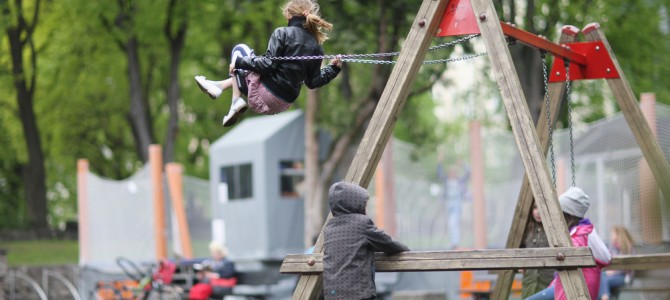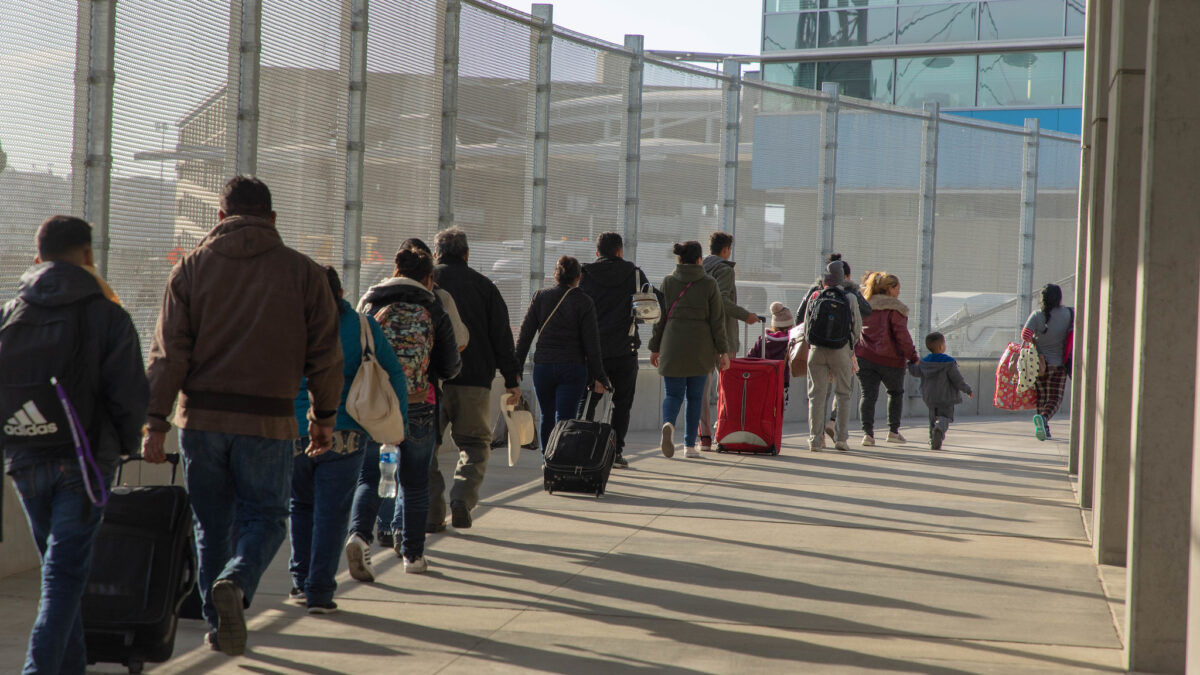
At the playground this week for our usual playdate, my friends’ children and mine were mostly alone until a short bus rumbled up and discharged something between one and two dozen children, all wearing neon-green shirts atop their clothes on a very humid day. The shirts were labelled with their preschool’s name, a common practice in our area as a form of little people crowd control. We’ve seen similar packs of same-shirted children at the zoo, the city gardens, and various parks.
Accompanying these kids were two caregivers, who also wore the green shirts. The mandatory minimum ratio of childcare providers to children in my state is one adult per ten children if the kids are three years old, and one adult to twelve kids if the little ones are four years old. This will become key to the story in just a bit.
My mother friends and I mostly chat while the children play, each of us breaking off occasionally to catch a slide occupant, find out where the boys went, or comfort a child who had accidentally damaged some appendage. I’m one of the most active moms because I have a particularly monkey-like child, who is too young to perform most of his acrobatics without direct supervision.
At one point, I looked up and saw my three-year-old daughter, mimicking a line of green-shirted preschoolers by hanging from her belly on a swing. She can’t pump, and looks comically helpless when she tries, but she loves to swing—high and fast. Knowing this, I trotted over and offered to push. Immediately after I had turned around from giving her an “underdoggy,” I faced a row of gleaming smiles in little white, medium-brown, and dark-brown faces. One little boy spoke for them all: “Can you give me an underdoggy, too?” His request was repeated up and down the swing line.
Now, I’m seven months pregnant, and it’s mildly painful for me to race down into a swing’s feet pit then up the other side, pushing a little person the entire way. I’d planned to just give my little girl one and then maintain her momentum by standing behind her and pushing with my hands, until I saw my monkey son about to kill himself again, at which point swing assistance would be over. That’s the usual drill.
So I looked at the expectant little faces and considered telling them, “No, I’m not your mommy. Sorry.” But I realized it wasn’t their fault their mommies weren’t there to fulfill at that moment the most earnest desire of their little hearts. And with at least six other kids to watch each, their caregivers were probably relieved this pack of kids was relatively still in one spot and thus easier to monitor without “needing much attention.” So I started racing down the little dips beneath each swing, a small, unknown child in my hands.
The swing episode lasted no longer than three minutes. But I can’t get it out of my head, this row of eager little lonely hearts capering about in the wood chips, swinging by their bellies because no one was nearby to help them enjoy a proper swing. They were technically fine, right? Nobody was hurt, especially hungry, or making mischief. But something was missing, all the same. That something was someone who loved these little goslings enough to nurture their hearts, to meet their unspoken, metaphysical needs; to treat them as more than a checklist of reoccurring daily needs.
Mothering Is What Happens In Between
For me, mothering is about what happens spontaneously, in the gaps, so to speak, between baths and snacks and meals and diaper changes and naps. Because even when a child’s needs are technically met, they can be not met at all. Mothering is being there to answer a child’s question, “Where did God come from?” or “How is the baby going to get out of your belly?” or “Can we read ‘Curious George’ [for the umpteenth time]?” It’s being there to pick up baby and kiss his boo-boo right when it happens, because in that very moment that’s what baby desires most. And he’s not wrong or stupid to want it.
Last year, I cancelled, last-minute, a speaking engagement in Las Vegas I had wanted very much to make. I was annoyed at having to give it up, in fact. But my baby came down with a fever and snuffles just the day before, and while I knew my husband could “handle it” just fine, I also knew that baby would get the most comfort in his relatively mild sickness from snuggling into mama’s skin and nursing whenever he felt like it. I don’t know how many of you have seen babies nurse, but their expressions of perfect bliss during a routine “feed” are one of the world’s wonders. It’s beatific.
If I had left for Las Vegas, I knew my sick child wouldn’t have that satisfaction during an existentially distressing time for such a little fellow, and I just couldn’t do it. Sure, he “would have made it through” with nary a memory of those painful two days, but who wants their children to just scrape by if we can instead meet the deepest needs of their little souls by participating actively in their lives, the way a mommy or daddy does?
Nothing will ever convince me kids trump up these needs, or that they can go unmet without legitimate suffering. About a year ago, I headed out the door to the airport to testify in front of some state legislature about some education bill. My oldest son, then three years old, trailed me down our front steps. I can still remember him trying bravely to hold back his tears, but he couldn’t. “Why are you going away again, mommy?” he asked. “Can’t you stay and play with me?” I almost started crying myself. But I had a joy I could share with him. “Mommy has some work to do, son. But I am almost done working so much. Mommy will soon have a new job that means she can stay home with you more.” We both smiled through our tears.
Money Can’t Buy Them Love
I know all about scarcity and Maslow’s hierarchy. The kids have got to get fed before mommy can spend hours reading to them on the couch. Some kids are lucky to just get body food. Soul food, for some families, is too much to ask. But if mommy can give her kids the gift of her self, present to those children, in addition to and between fulfilling their most obvious physical needs, she’s offering them the food of love that every soul, little and big, really needs for survival.
Life might be preserved by someone who keeps the kids from running into the street, but it is made worth living by someone who feeds the children her very life. Nursing is a perfect example. Baby receives from it necessary calories, yes, but also comfort. Mommy pours into that baby both food from her very blood and love from her very heart. And the child feeds on both. He needs both to make him human.
Last night, my husband and I began watching “Kingsman: The Secret Service,” and one two-second throwaway scene was seared painfully into my mind the instant I saw it. It was of the young protagonist’s low-class home, in which his step-father and floozy mother sit on the couch and watch TV while his tiny step-brother lies in the playpen, crying. The young man, as he walks out of the house, gives the child a pacifier.
It’s some small comfort to the child. But everyone watching knows he needs a lot more than a pacifier. He needs a mother and father who comfort him when he cries. These parents are horrible because they hear the child cry, and do nothing. But is it any better or different to a child if his parents don’t pick him up because they aren’t there? Can another random person or string of them really provide a satisfying substitute for the people he longs most to have and to hold?
If a small child swings alone on a playground and nobody who loves him is nearby to help him to a thrilling ride, does his yearning for that ride disappear?









